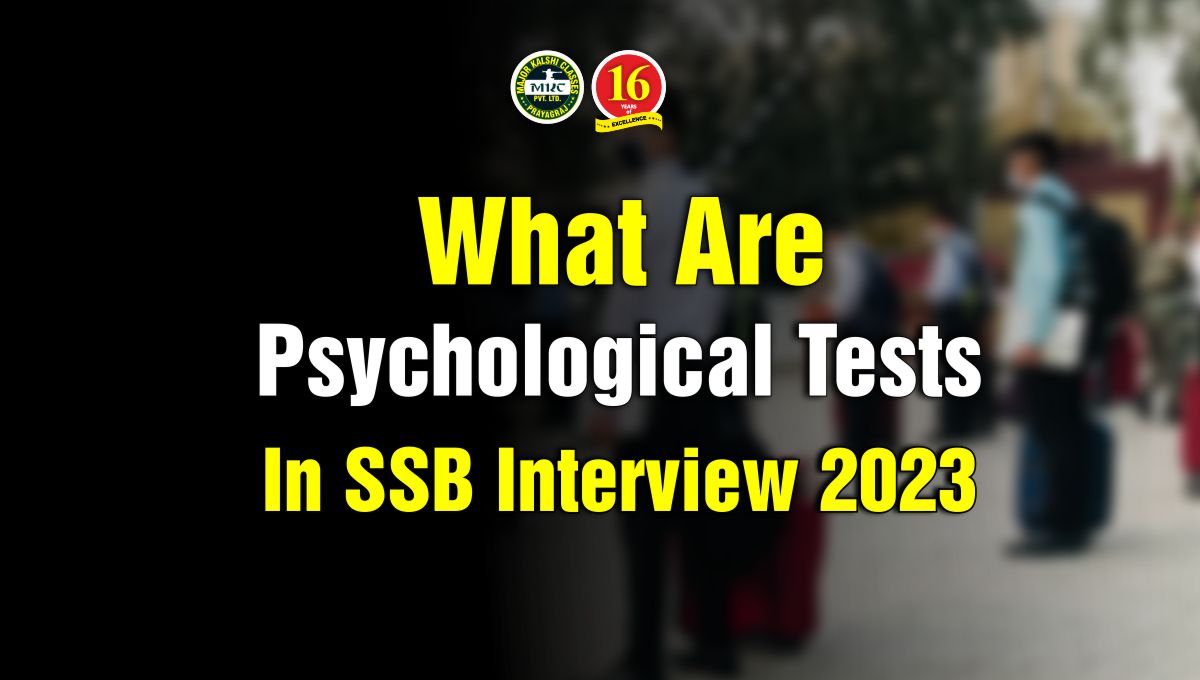What Are Psychological Tests in SSB Interview 2023
The Services Selection Board (SSB) interview is a crucial step in the selection process for candidates aspiring to join the Indian Armed Forces. It is known for its rigorous evaluation of candidates’ personality traits, psychological characteristics, and aptitude for leadership. As part of the SSB interview, candidates are subjected to a series of psychological tests. In this article, we will provide a comprehensive overview of the psychological tests in the SSB interview for the year 2023.
What Are Psychological Tests:-
Psychological tests in the SSB interview are designed to assess the candidate’s psychological suitability for officer-level positions. These tests aim to gauge various aspects of a candidate’s personality, including their emotional intelligence, problem-solving skills, decision-making abilities, social adaptability, and leadership potential. The following are the key psychological tests conducted during the SSB interview:
- Thematic Apperception Test (TAT): The TAT involves the candidate’s interpretation of a series of pictures shown to them. Candidates are required to create a story based on each picture, including the characters, events, and outcomes. The purpose of this test is to assess the candidate’s imagination, storytelling abilities, emotional intelligence, and their response to various social situations.
- Word Association Test (WAT): The WAT consists of a series of words flashed to the candidates, who are then required to write down the first thought or idea that comes to their mind in response to each word. The aim of this test is to evaluate the candidate’s thought process, creativity, spontaneity, and their underlying attitudes and beliefs.
- Situation Reaction Test (SRT): The SRT presents candidates with a series of hypothetical situations or scenarios and asks them to choose the most appropriate response from a set of options. This test assesses the candidate’s ability to analyze situations, make decisions under pressure, and demonstrate problem-solving skills.
- Self-Description Test (SDT): The SDT requires candidates to provide a self-description in terms of their strengths, weaknesses, likes, dislikes, and aspirations. This test helps evaluate the candidate’s self-awareness, level of introspection, and their ability to reflect on their own personality and experiences.
- Group Discussion (GD): While not specifically a psychological test, the group discussion is an important component of the SSB interview. It assesses the candidate’s communication skills, ability to work in a team, leadership potential, and their approach to problem-solving and decision-making in a group setting.
It is important to note that there are no right or wrong answers in these psychological tests. The SSB interview focuses on evaluating the individual’s personality traits and attributes that are desirable for officer-level positions. Candidates should strive to be authentic, genuine, and true to their own personality during these tests.
To prepare for the psychological tests in the SSB interview, candidates should:
- Practice self-reflection and introspection to better understand their own personality traits, strengths, weaknesses, and values.
- Enhance their ability to think on their feet, make decisions under pressure, and respond effectively to various social situations.
- Develop their creativity, imagination, and problem-solving skills through activities such as reading, writing, and engaging in group discussions.
- Familiarize themselves with the SSB interview process, including the different psychological tests, by studying relevant resources and consulting with experienced candidates or mentors.
- Engage in mock tests and practice exercises to simulate the test environment and gain familiarity with the types of questions and scenarios that may be encountered.
Remember, the psychological tests in the SSB interview are designed to evaluate your personality and suitability for a leadership role in the armed forces. Stay true to yourself, be confident, and showcase your strengths and potential. With adequate preparation and a positive mindset, you can increase your chances of performing well in the psychological tests and progressing further in the selection process.








